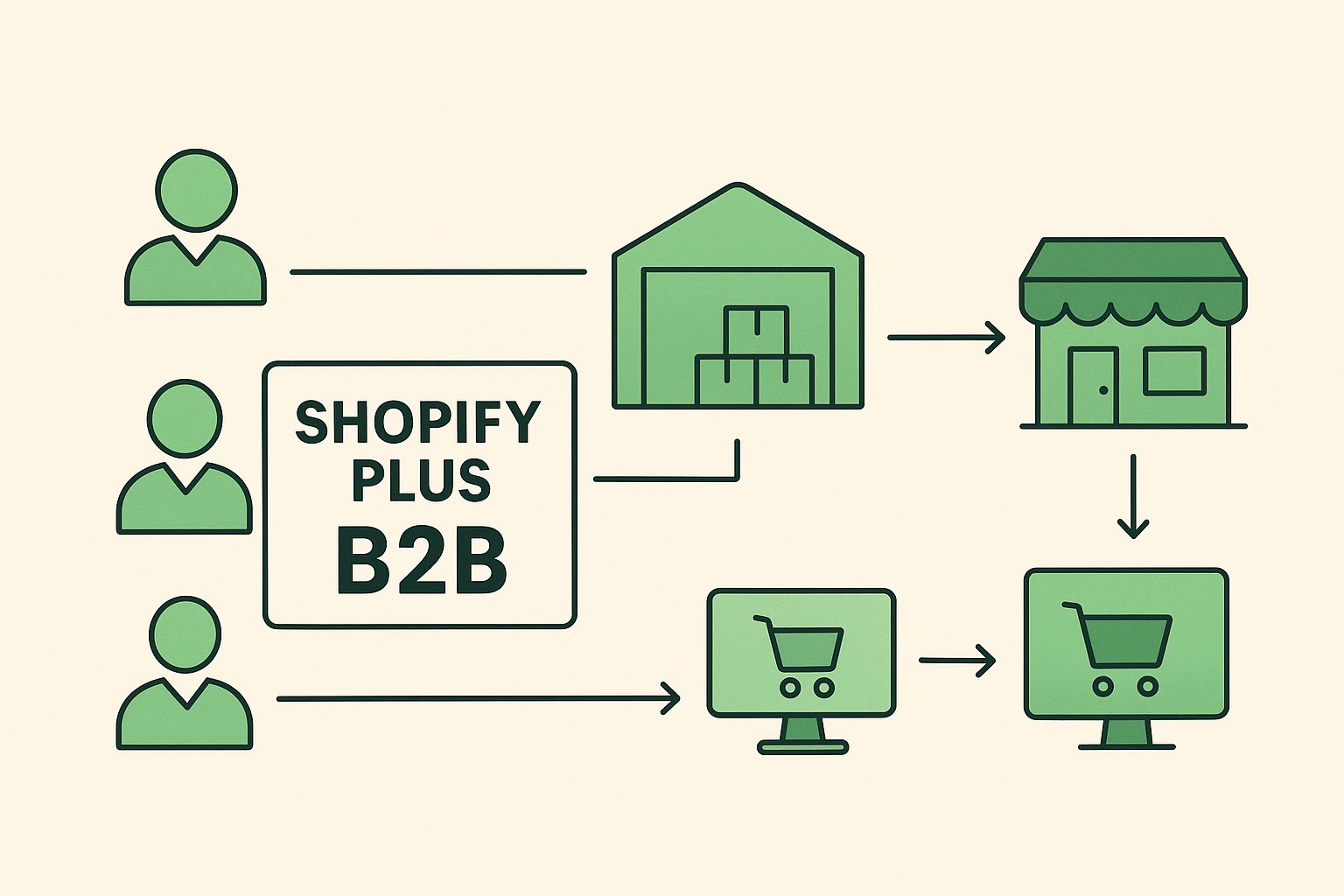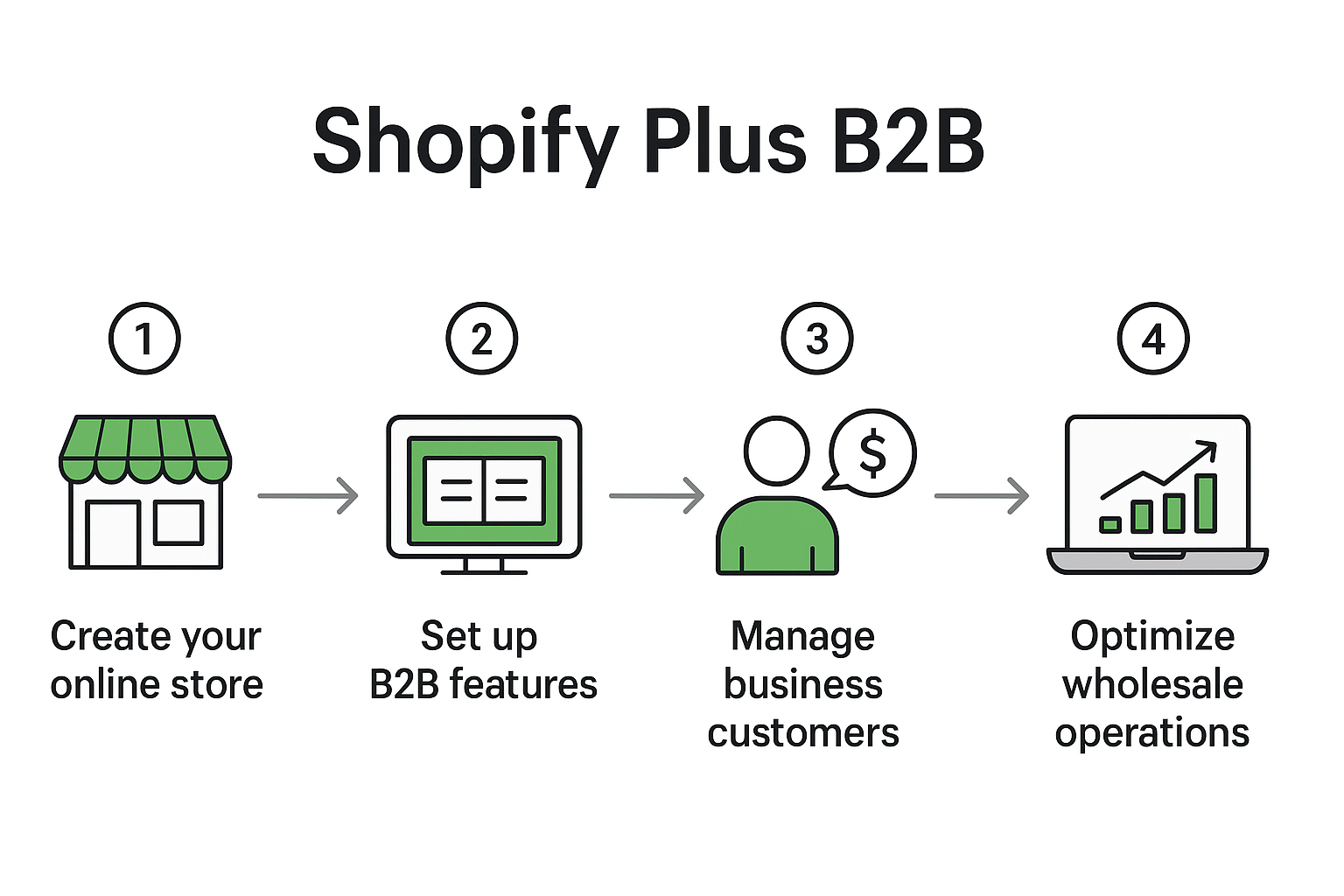Why Shopify B2B?
B2B commerce (business-to-business) is undergoing a strong acceleration toward digital transformation. Companies that sell to other businesses are looking for e-commerce solutions that go beyond the limitations of B2C (business-to-consumer) models and enable complex processes such as bulk ordering, personalized price lists, payment terms, management of corporate accounts, and much more.
The Shopify Plus platform meets this need by offering a set of features designed specifically for B2B. In this article, we’ll explore what it offers, why it’s advantageous, and how to leverage it strategically.

Key Features
An essential requirement to access Shopify’s B2B features is having a Shopify Plus plan. That said, let’s take a closer look at the features Shopify offers to its customers:
- Companies: companies can use a single platform to represent all their B2B customers — from small independent retailers to large franchise chains.
- Markets: sellers can create and manage multiple customer groups — each with its own catalogs, currencies, and store customizations — all from a single point within the Shopify admin panel.
- Catalogs: to determine the prices and products that B2B customers see when accessing the online store.
B2B sellers can create catalogs to tailor pricing and product selection to the specific needs of each of their customers. - Checkout: Shopify’s checkout offers a streamlined, optimized design to handle complex B2B transactions.
The checkout experience includes several features, such as a dedicated field for purchase order (PO) numbers, an option to submit orders as drafts for later review by the seller, and much more. - Customer accounts: these allow customers to independently manage their orders (such as duplicating previous ones) and their online accounts at any time.
- Users and permissions: thanks to a flexible user and permission structure, companies can grant team members limited access to the Shopify admin panel, allowing them to place orders and view information only for the customers assigned to them.
- Custom storefronts: these allow sellers to offer personalized shopping experiences to their customers, such as presenting customized content, all from a single theme and a single admin panel.
Benefits
But what are the real benefits that make using Shopify Plus for B2B a tangible operational advantage? Let’s take a closer look:
- Operational efficiency: a single platform for managing both B2C and B2B channels reduces data duplication, facilitates reporting, and streamlines operations.
- Scalability: a platform designed to support large order volumes, extensive catalogs, and rapid business growth over time.
- Better customer experience: today’s business customers expect speed, transparency (price lists, discounts, reorders), and a B2C-level experience. Shopify Plus makes this possible.
- Reduced maintenance costs: thanks to the extensive native B2B features, the need for external apps, custom integrations, or complex maintenance is reduced.
- Simplified internationalization: with support for multiple currencies, multi-store setups, and localization, new markets can be entered more quickly and efficiently.
- Enterprise-grade security and reliability: for B2B, stability, performance, and security are crucial. Shopify Plus delivers high standards in these areas.

Operational Strategies and Conclusion
To fully leverage the potential of Shopify Plus B2B tools, it is essential to adopt a strategic approach that combines personalization, operational efficiency, and technological integration. The first step is to define a tailored shopping experience for business customers by utilizing the key features outlined above. This level of personalization not only strengthens customer loyalty but also simplifies the management of long-term business relationships. At the same time, process automation represents a key element for boosting productivity and reducing operational errors: for example, automatic management of recurring orders, internal approvals, and integration with ERP or CRM systems help ensure a smoother workflow and a better data control, while keeping inventory availability updated in real time. Another crucial strategy involves optimizing the user experience: using clear dashboards, simplified purchase flows, and quick reorder options helps reduce transaction times and encourages a continuous use of the platform. Additionally, implementing a self-service portal, where customers can independently manage orders, invoices, and company data, helps reduce pressure on the sales (customer care) team. Constant performance measurement is also an essential requirement for refining strategies over time: analyzing sales data, purchasing behavior, and interactions with the platform allows companies to identify new growth opportunities and optimize B2B marketing campaigns (leveraging Shopify Plus’ analytics tools and integrations with business intelligence platforms).
For companies that sell to other businesses, choosing an e-commerce platform that supports the specific needs of B2B is a strategic decision. Success with Shopify Plus’ B2B tools therefore stems from balancing personalization, automation, integration, and analytics: an operational ecosystem that makes managing business customers more efficient and the overall business model more competitive.
Let’s transform your digital landscape together
Unlock the full potential of your digital presence with our expert marketing strategies designed to drive growth, engagement, and conversion. Connect with us today to transform your vision into success.